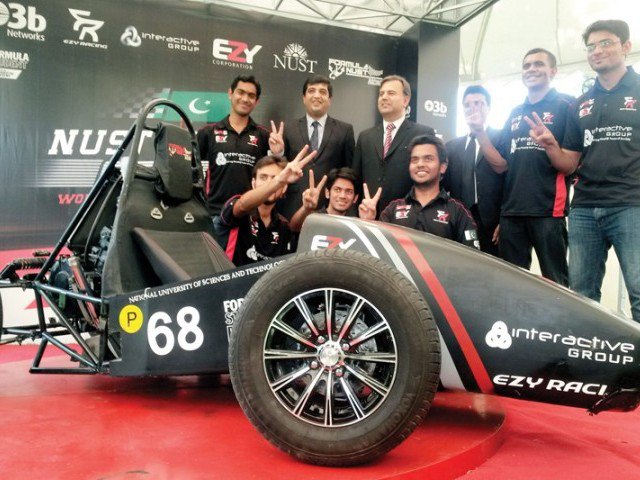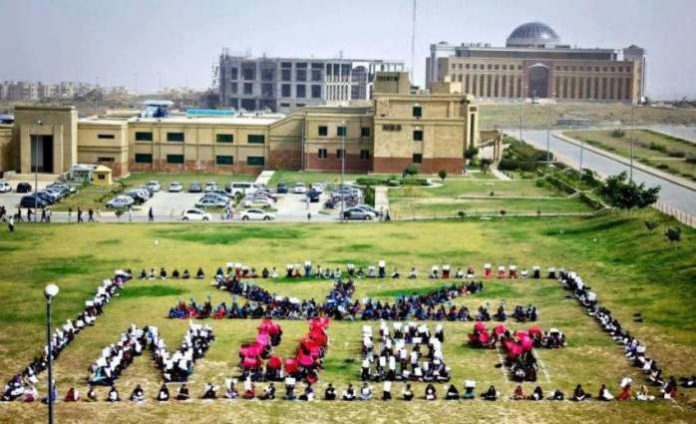Dear Readers,
The quest to create “world-class” universities has become something of a global obsession in the past decade as governments across the world have put the development of competitive higher education and research systems at the heart of their national economic strategies. The Islamabad based National University of Science & Technology (NUST) has grown to be one of the new generation of Pakistani Universities having a progressive and innovative outlook that has flourished as a modern centre of excellence for research and development in the fields of sciences and technology. NUST is committed to the provision of intellectual leadership and development of indigenous technology and to emerge as a beacon of light for the country’s scientific and technological progress and needs. NUST has been ranked amongst the best in the world by the QS World University Rankings, which publishes annual university rankings of the world’s top universities on 48 different subjects and five composite faculty areas, alongside independent regional tables. The QS World University Rankings is the most-widely read university rankings in the world. My article TITLED ‘NUST: THE FUTURE BRINGING TODAY’ is being reproduced for the benefit of readers.
A public research university under the administration of Pakistan’s Armed Forces, the National University of Sciences & Technology (NUST) with its main campus in Islamabad, Pakistan was founded in 1991. Initially formed for the need by combining engineering colleges and schools of Pakistan Armed Forces, for the commissioned officers. Later, it was converted into a public research university with the main campus in Islamabad to promote science and technology. Today NUST is a comprehensive civil-military collaboration platform comprising 19 constituent institutions (including five military colleges) spread over seven campuses across five cities of Pakistan Islamabad, Rawalpindi, Risalpur, Karachi and Quetta, a truly national university across in all four provinces of the country.
NUST adopted an American university model and stressed laboratory instruction in applied science and engineering. The university offers undergraduate and graduate degrees, including doctoral and professional degrees. Merit is the only criterion for admission at NUST, the acceptance rate of 4% that tells about the high number of applicants this university can chose its students from a pool of most talented young people from the country. More than 60% of the student intake that qualifies comes from the lower and lower-middle income grouping. NUST maintains an affordable fee structure to promote inclusivity, and also has a robust need-based scholarship programme to support financially challenged students.
Consider the growing number of female students that are earning degrees in technical and science programs. Engineering is still a male-dominant professional world even in the West; female candidates are few. There is a myth that strength is only for males and that girls can’t handle the practical side of engineering. The differences that exist are learned as a result of what society deems males and females should be/do. These social constructs are deeply disturbing but we should concentrate on the passion and abilities of the person in question. These barriers have been overcome by growing number of exceptional women studying engineering at the NUST Pakistan Navy Engineering College (PNEC) in the heart of Karachi, and other divisions of the diverse institutes of NUST.
Over the years, the quality of education and research at NUST has grown which is manifest in the quality of its undergraduate and post-graduate programmes in a range of disciplines well. All the 19 engineering programmes accredited under the Washington Accord. New institutions are added to the profile; out of the four National Centres of Excellence established by the Government of Pakistan, two were awarded, after an open and rigorous competition, to NUST. Those are the National Centre of Artificial Intelligence (NCAI) and the National Centre of Probiotics & Automation (NCPA) which will contribute to Pakistan’s march into the 21st century.
NUST is also the only higher educational institution in Pakistan to have transferred technology to the industry; in the past three years alone, 13 technologies have been transferred to respective industries. Accounting for a total of 36 Intellectual Property Rights (IPRs), these technologies have been impacting import substitutions and industrial innovation across multiple fields like health, telecommunication, manufacturing, etc.
Amongst the numerous firsts ascribed to NUST is the inauguration of Pakistan’s first Science & Technology Park the National Science & Technology Park (NSTP) at NUST’s Islamabad campus, which was inaugurated by PM Imran Khan in December 2019. Essentially brought together industry and academia to work in close synergy the Park create a national research and innovation ecosystem, adding value to the technological index of Pakistan.
There are many pioneering initiatives to its credit like Pakistani academia’s first Technology Incubation Centre (established in 2005 and renamed to Tech-One in 2019) to promote entrepreneurship, first Intellectual Property Office to protect innovation, first-ever technology transfers to the local industry to fuel indigenisation and high-tech manufacturing, first university-based think tank (NUST Institute of Policy Studies NIPS), first production facility for cardiac stents and other medical devices at a fraction of cost of the imported devices, and much more NUST is well-poised to become a regional hub of higher education and innovation.
During the trying time of the COVID-19 pandemic scientists at NUST Atta-ur-Rahman School of Applied Biosciences (ASAB) indigenously established robust, target-sensitive and cost-effective Molecular Diagnostic Assays for the detection of Novel Coronavirus. Considering that COVID-19 may prolong or recur, these indigenously developed cost-effective kits will, Insha Allah, give boost to efforts for the detection of virus in minimum time.

Scientists at NUST College of Electrical & Mechanical Engineering (CEME) have also indigenously developed unmanned ground vehicles named N-Rover, and assembled and deployed aerial systems named Aero-N for decontamination of open and closed spaces. These systems fight the virus’s outbreak by disinfecting critically important surroundings and locations like Indoor & outdoor quarantine camps, etc.
The Robot Design & Development (RDD) Lab at the National Centre of Robotics & Automation (NCRA) housed at NUST CEME, has developed a bilingual (Urdu and English) screening app, which is the world’s first Urdu app for Android. Named COVID CHECK PAKISTAN, was used for 8200 screenings in 9 different countries within the first 2 days of its beta rollout on March 23, 2020.
Expertise from a wide variety of sources from within/outside the country in order to boost its academic and research activities helps NUST create a deeper impact on the world of science and technology. For the purpose, the University collaborates with leading international universities, professional/research organizations, commercial ventures, talented professionals and scholars to pursue its academic and research goals. It has developed linkages with as many as 165 international universities and organizations of 35 different countries.
Based on these achievements and building upon its reputation as a quality higher education institution with a strong academic and Research and Development base. “NUST has not only retained its No.1 position in Pakistan in the discipline of Engineering and Technology, but also moved up 61 positions since last year, becoming the only Pakistani university in top 300 world universities in Engineering and Technology, as per Quacquarelli Symonds (QS) Subject Rankings 2020 released the other day”, said a press release.
For me NUST has a personal connection, that of my unit 4 Sindh. Before he retired, Lt Gen (Retd) Naweed Zaman, HI (M), the Rector of NUST was Corps Commander, Lahore. He is the brother-in-law of Brig Moin (Shaheed) assassinated by terrorists presently in Islamabad in 2010 near Golra, very close to the NUST campus. Very much like Brig (Retd) Mujhahid Alam, presently Principal of Lawrence College, Ghoragali, who has restored GG’s to its eminent status in education, late Moin was very much COAS material. He took 4 Sindh, already a formidable infantry unit, to new heights of professionalism and excellence. SARMAST remains “Second to None”. My pride extends to Naweed, an outstanding soldier who in is his second career has excelled in not only providing education par excellence through NUST but showing us how education can be organised to cope and adjust to the demands of the “Fourth Industrial Revolution”: He is a credit to the officers corps of the Pakistan Army. For sheer excellence, NUST must act as a model for other Pakistani universities, they must emulate what Naweed and his colleagues, many of the eminent educationists and professionals in their own right, have achieved. Along with NUST they deserve all the plaudits one can give them.
“The opinions/views expressed in Defence Journal are entirely those of the writers and cannot be construed to reflect the official views of Defence Journal”.




